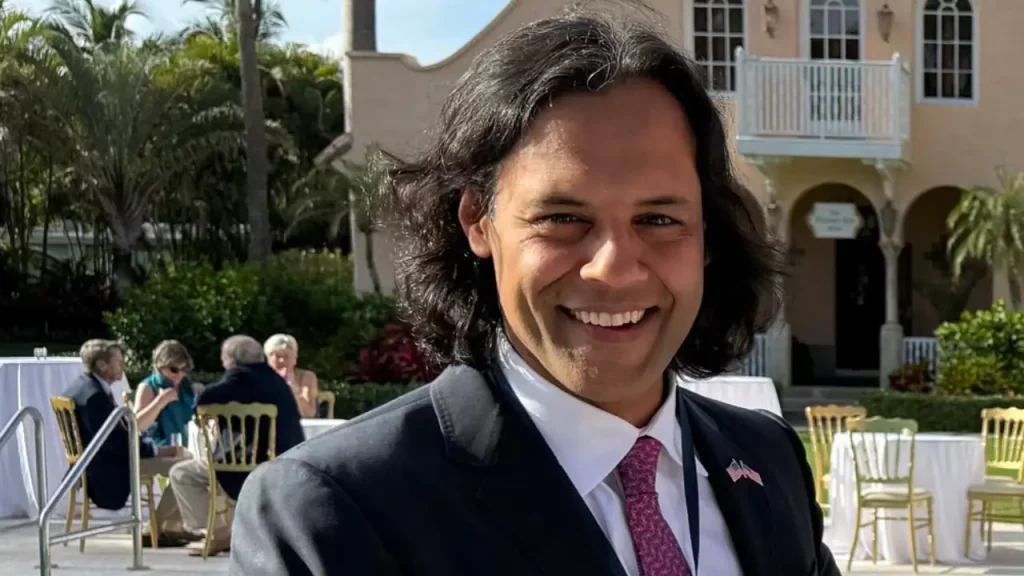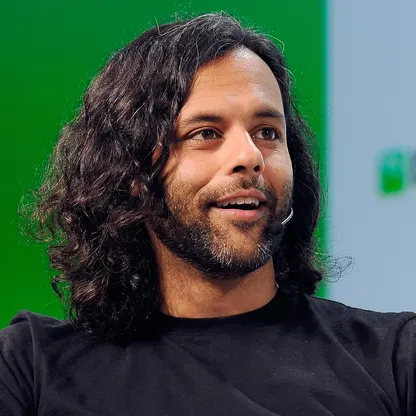(September 22, 2025) “Being an immigrant kid, your whole life is kind of a startup,” Baiju Bhatt recently remarked in a podcast, and his story proves it. On the 2025 Forbes 400 list, Bhatt stands out as the only Indian-origin member amongst the 10 Youngest Billionaires in the United States. At 40, Baiju Bhatt holds a $6 billion net worth from his six percent stake in Robinhood, the commission-free stock-trading and investing platform he co-founded. He joins an elite club that includes Mark Zuckerberg (41) and Walmart heir Luke Walton (38).
Robinhood’s stock has surged nearly 400 percent in the past year, boosted by record 2024 revenues of $3 billion and a wave of crypto trading and high-yield products. But Bhatt’s next frontier is far beyond Wall Street, and is literally out of this world. He has launched Aetherflux, a space-based solar energy venture that plans to beam power from orbit to Earth using infrared lasers.

From immigrant roots to Silicon Valley
Born in Virginia to Gujarati immigrant parents, Bhatt grew up surrounded by both science and struggle. His father, a NASA scientist, had to abandon doctoral studies when kidney failure struck soon after the family arrived in the United States. “My dad had a bunch of health problems when I was a kid,” Bhatt recalled, describing how medical bills erased hopes of visiting India after 1997. The experience taught him “mental toughness” and a single-minded belief in education. “Education is the one thing that I can control in my life.”
Without ever setting foot on campus, he chose Stanford University, earning a physics degree and a master’s in mathematics in 2008. There he met fellow Virginian Vlad Tenev. They bonded over late-night problem sets, chess games, and gym sessions, forming the early template for a co-founder partnership built on trust, stamina, and curiosity. The parallels between them ran deep. Bhatt and Tenev were only children whose fathers had come to America in pursuit of higher education. With small families as their nucleus, friendship took on outsized meaning, a bond that later proved invaluable when their work demanded unshakable trust.
Running toward transformation
Before IPO bells and space ventures, Bhatt literally ran himself into a new life. Overweight as a teen, he shed nearly 70 pounds one summer. “When you’re that heavy, you’re really pushing through,” he said. Running became his daily ritual and a way to reset his mind. “If you ever need to think about something or you’re kind of stuck on a problem, going out for a run is a great way to reset the brain.”
That discipline carried into entrepreneurship. “If you can’t control your own body, there’s a disconnect. Even if it’s 102 degrees outside, I’m going to keep the discipline of doing this.” Midday runs around Stanford stayed with him through Robinhood’s early years.
When you get through doing a really hard workout, it puts the rest of the world in perspective.
Baiju Bhatt
For Bhatt, the pattern has been clear: curiosity, discomfort, discipline, then clarity. It is the same loop he has applied to his entrepreneurial pursuits.
Childhood shaped by illness and inspiration
Life at home balanced hardship and wonder. His father’s kidney failure, “pretty much right when he came to the US” brought hospital stays and financial strain, while his work at NASA filled Bhatt with awe. “There’s this wonder about the fantastical things we build to study space,” he said. Those experiences made fitness and academics personal missions and planted the seeds for Bhatt’s eventual return to the cosmos. “Education is the one thing that is going to set my path forward,” he realized. The adversity, hospital bills, and uncertainty became raw fuel for ambition.
Reinventing finance for the masses
Graduating during the 2008 financial crisis, Bhatt watched friends struggle to find jobs while he and Tenev experimented with electronic trading technology. In 2013 they founded Robinhood to “democratize investing.” “The financial system is the reason so many people want to be here. Rather than tearing it down, we wanted way more people to be a part of it,” he said.
Investors were skeptical. “We were broke,” he laughed. “You have to be a little bit delusional to start a business. You have to believe in your own ideas because no one’s going to believe in them more than you do.” By 2015 their sleek, commission-free app won an Apple Design Award and rewrote the rules of retail investing. Bhatt led product and design while Tenev focused on engineering and finance. “If one of us was more passionate about a problem, we’d let that person run with it.”

Baiju Bhatt with his friend and co-founder of Robinhood, Vlad Tenev
Listening to the customer
Robinhood’s mantra of democratizing finance for all was backed by relentless user research. Bhatt and his team interviewed students and new investors to understand how people actually live with money. Features such as fractional shares and recurring investments grew directly from those conversations. “If you don’t know what you’re doing with your finances, that’s not cool. You have to be in control,” he said.
Bhatt rejects the idea that design and responsibility are at odds. The real work, he argues, is context and empathy, knowing the difference between a well-paid engineer’s experience and someone living paycheck-to-paycheck, and building for both.
Advice for founders
Bhatt’s guidance to entrepreneurs is direct and hard-earned. “You have to outwork and outwork and outwork. Dream big, but know how to work small. Ambition sets the destination; repetition gets you there.” He often points to the early days of Robinhood when he pitched skeptical investors while living on a shoestring and how relentless effort mattered more than perfect conditions. Belief in your own idea, he says, must come first and that conviction is what carries a founder through long stretches of doubt and rejection.
Building an energy grid in space
In October 2024 Bhatt launched Aetherflux, a space-based solar energy company headquartered in San Carlos. The plan is to collect solar power in orbit and beam it down to Earth via infrared lasers, delivering round-the-clock energy without the need for vast tracts of land.
If you collect solar power in space you can actually have access to solar power around the clock. We want to do for power what Starlink did for the internet.
Baiju Bhatt
He believes the concept is ready for reality. With heavy-lift rockets like Starship, “building huge infrastructure in space” has moved from science fiction to a practical roadmap. Two satellites are scheduled to launch next year, with manufacturing and regulatory work already underway. “We’re going to be able to show the real parts of it in the next two to three years,” he said.
Beyond Earth
Bhatt’s vision extends well past orbital power. He predicts asteroid mining, manufacturing on the Moon, and even Martian settlement within his lifetime. “There’s such an obvious use for that,” he said, pointing to the Moon’s weaker gravity as a springboard for industry. For him these are not fantasies but the next logical steps in human enterprise.
The sun is our greatest energy source, emitting more in an hour than Earth uses annually. In the 1970s, researchers turned to space solar power to harness this energy in a meaningful way. Sunlight in space is more powerful than incident sunlight on Earth, and collection in space is largely unaffected by day-night cycles and weather.
Baiju Bhatt
For Bhatt the mission is more than technological. He believes energy is the driver to progress. “Access to energy is the thing that drives economic progress.” The entrepreneur pointed out in a social media post that that global energy consumption continues to skyrocket, while the United States remains dependent on outside sources. He highlighted the added strain of artificial intelligence, global conflicts, and the electrification of everyday life as forces driving demand. In his view, a network of satellites that beams clean power to Earth could open economic doors for remote communities and help the U.S. secure leadership in a critical sector.
Inspirations and ambitions
Baiju Bhatt draws guidance from an eclectic trio: Steve Jobs for his obsessive focus on user experience, physicist Richard Feynman for playful curiosity, and Tupac Shakur for fearless individuality. “He was who he was, unabashedly to his core,” Bhatt said.

Beyond the billionaire label
From a childhood of illness and financial strain to co-founding a platform that opened investing to millions, Baiju Bhatt embodies the audacity of the immigrant dream. Today, as he prepares to send solar-power satellites into orbit, he remains driven by curiosity more than wealth. “You can change circumstances in your world,” he said. “Dream big. Work hard. Keep running, even when it’s 103 degrees.” In a life that began in setbacks, Bhatt has proved that the universe, like a startup, rewards those willing to chase the unknown.
- Follow Baiju Bhatt on LinkedIn
ALSO READ: Time 100 trailblazers Manjusha Kulkarni and Priyamvada Natarajan named Great Immigrants of 2025



